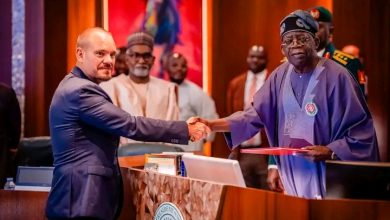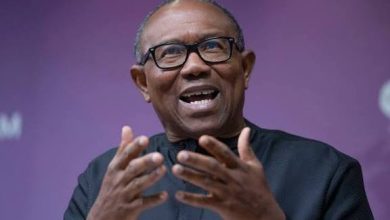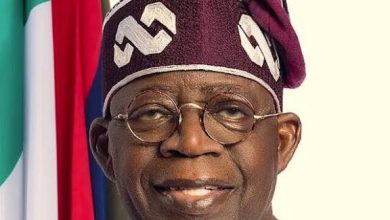Nigerian Militant Henry Okah Launches New Appeal For Release From South African Prison

By Passman Akpos
US-based Kabowei Akamande, who represents the organisation, travelled to South Africa earlier in October to visit Okah in prison and to deliver the petition.
Jailed Nigerian militant, Henry Okah, has launched a new appeal to South African authorities for his release from prison, where he is serving a 24-year sentence imposed in 2010 for two bombings in Nigeria that killed at least a dozen people.
The Nation Forum (INF), a group representing the main ethnic nationality in the oil-rich Niger Delta, described Pretoria’s imprisonment of Okah as “a hostile and unwarranted intervention” in Nigeria’s internal armed conflict.
US-based Kabowei Akamande, who represents the organisation, travelled to South Africa earlier in October to visit Okah in prison and to deliver the petition.
He said that there had been no formal complaint from the Nigerian state about Okah, which meant South Africa had no right to intervene.
The petition was signed by, among others, traditional rulers, community leaders and minority and environmental rights activists from the Niger Delta region.
“The charges for which Okah is detained in a South African correctional facility pertain to events that unfolded due to social unrest and a protracted armed conflict, as defined by international humanitarian law, within Nigerian territory,” the petition states.
The group says although it abhors violence against the Nigerian state, it recognises that Okah has “legitimate and compelling reasons” for fighting for his people’s freedom.
Okah’s supporters frame the conflict, ongoing for more than two decades, as a “quest for self-determination, a manifestation of a people’s collective will to resist oppression, aggression and subjugation by a collaboration of the Nigerian state and Western multinational corporations extracting petroleum riches from our land”.
Okah, 60, has been a South African permanent resident since 2007 and was sentenced to 24 years in prison in 2013 after he was convicted under the Protection of Constitutional Democracy Against Terrorism and Related Activities Act (2004) on 13 charges of terrorism.
This included bombings that killed 12 people and injured 36, and were, according to a full bench of Constitutional Court justices, “intended to inflict maximum carnage”.
Okah was in Nigeria during the Warri bombing on 15 March 2010, but in South Africa during the Abuja bombing on 1 October 2010, which targeted Nigeria’s Independence Day celebrations.
The Movement for the Emancipation of the Niger Delta (MEND), an umbrella group of armed militants fighting for greater local control of the region’s oil wealth, and led by Okah at the time, claimed responsibility for both attacks.
Okah also received a 13-year jail sentence, to run concurrently, for threats he made to the South African government after his arrest. His sentence was confirmed by the Constitutional Court in 2018 after a number of appeals.
The INF argues that Okah’s 2010 arrest by the Directorate of Priority Crimes, also known as the Hawks, was unlawful because the South African branch of Interpol should have done so.
They had no business arresting him the first place.
“The armed conflict in the Niger Delta has, at all times, been a quest for self-determination, a manifestation of a people’s collective will to resist oppression, aggression and subjugation by a collaboration of the Nigerian state and Western multinational corporations extracting petroleum riches from our land,” the forum says in its petition.
Akamande tells The Africa Report that the organisation wasn’t petitioning Ramaphosa for a pardon, as Okah did not do anything wrong.
“Okah considers himself a prisoner of war,” he says. “They had no business arresting him the first place.”
The matter, Akamande adds, could not be addressed diplomatically as the Nigerian government doesn’t have sympathy for Okah’s plight.
Okah tried to petition the court to declare his detention wrongful, but accused court officials of tampering with his applications. Okah’s complaint about the tampering to the Chief Justice as well as the Judicial Service Commission was dismissed, but his appeal against this dismissal was upheld, and he is awaiting the outcome.
Akamande also says Okah had suffered “extreme psychological and physical torture” in prison and that his complaints about this had fallen on deaf ears.
Such a petition is a futile exercise.
Inspecting Judge of Correctional Services, retired Justice Edwin Cameron, tells The Africa Report: “We certainly follow up every single complaint we get from C-Max, and I can assuredly say we have followed up any complaint he lodged with us.”
Ramaphosa’s spokesperson, Vincent Magwenya, tells The Africa Report he didn’t know if the presidency had received the petition.
“Regardless of whether our office would have received that petition or not, a basic reading of our laws will guide that the president does not interfere with law enforcement processes, nor does he have the power to do so. Therefore, such a petition is a futile exercise.”





